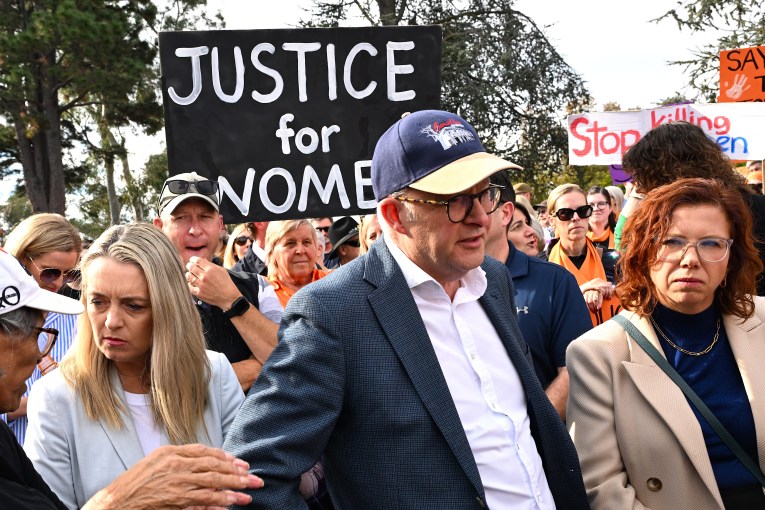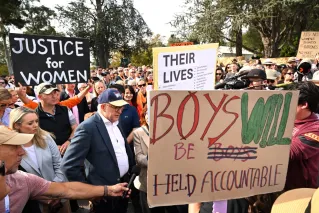Do we really care more about a magpie called Molly than a murder victim of the same name?
A shocking, growing list of gender violence victims has done nothing to prick the conscience of our lawmakers. Madonna King asks what will it take?


Molly Ticehurst was found dead in a Forbes home on Monday.(Supplied: Gofundme)
Molly. Hannah. Emma. Tara. Kiera. Chaithanya. Joanne. Alana.
The list of names goes on. All women. Varying ages. And all calling different communities across Australia home.
They are also all dead, the result of frenzied gendered violence. Gunshots. Being chased by a car. Being stuffed into a wheelie bin. Choked to death. Bashed beyond recognition. Stabbed. Set on fire.
It’s hard to write those words. This is not a war zone. This is Australia in 2024, where a woman has died through gendered violence every four days since January 1.
And despite the celebrations over coercive control legislation and the calls for increased funding for domestic violence victims, the tally continues to climb.
STOP.
What are we doing here? Or what are we not doing?
When police in Australia receive a report of a domestic violence incident every two minutes, we have to consider this as a national problem, needing a national solution.
We’ve got to stop funding initiatives in dribs and drabs and trying to protect women with a bit of this legislation and a bit of that legislation.
We have to stop talking and saying we are going to do better – and actually do better.
This is not a matter only of protecting women from violent partners and ex-partners.
It’s about ensuring more women who are subject to abuse report it.
It’s about educating police and magistrates so they understand what domestic violence might look like.
It’s about finding a way of protecting women (and men) who authorities know are at high risk of homicide.
It’s about systemic change and cultural change.
And men have to be a bigger part of that march forward.
Molly Ticehurst is one of two women whose savage deaths made headlines this week. And she should be the impetus for us to act, in the same way the murders of Hannah Clarke and her three young children in 2020 prompted politicians to listen to those advocating for coercive control laws.
No-one ever should die at the hands of someone who once professed to love them. But Molly’s case, on face value, is also a text book illustration of a broken system.
Daniel Billings, the man who stands accused of her murder, was in jail on rape and stalking charges, when he wanted bail.
But because a magistrate was reportedly unavailable in rural Australia on that weekend, a court officer was left to make a decision on whether he should be released.
This isn’t on any individual; this is on an archaic system that shows the country-city divide that our rural communities so strongly and persistently articulate.
Billings was set free, with a surety, an apprehended violence order and a ban on travelling to Forbes, where Molly worked and lived.
Molly’s father has told media she was fearful and couldn’t sleep and went away for a week.
Why should she have to upend her life because she is scared she will be attacked?
Molly could have been your daughter or my daughter. Our little sister. Our neighbour or our friend. Just imagine her life, and the life of her child, during those seven days.
According to court reports, on mention of the charges last week, Billings was not held in custody, and within a few days, Molly had lost her life.
NSW Premier Chris Minns looked heartbroken, and admitted the system was not working for women like Molly. He could have been any of our premiers, on that day.
Of course now NSW will look at the practice of court registries deciding on bail. The next budget will have a boost for victims of domestic violence.
Molly’s family and friends – like those who knew and loved all the other women killed this year – will travel through life, the best way they can.
That’s not good enough. Let’s not let this week pass without a determination to do more than look at a tiny piece of this puzzle.
What about the success of apprehended violence orders? Do they actually work?
What about how police are trained to deal with domestic violence incidents? Is that best practice?
From bail laws to the education of our magistrates, we need to sit around a table with a blank piece of paper, and Molly’s name scrawled across the top.
Walks will bring attention. So do donation drives and budget windfalls. And teaching our children – boys and girls – about how to treat a partner.
But we need a bigger buy-in from good men too, who will listen and learn and even lead this debate.
And that should start, next week, with the prime minister Anthony Albanese.












